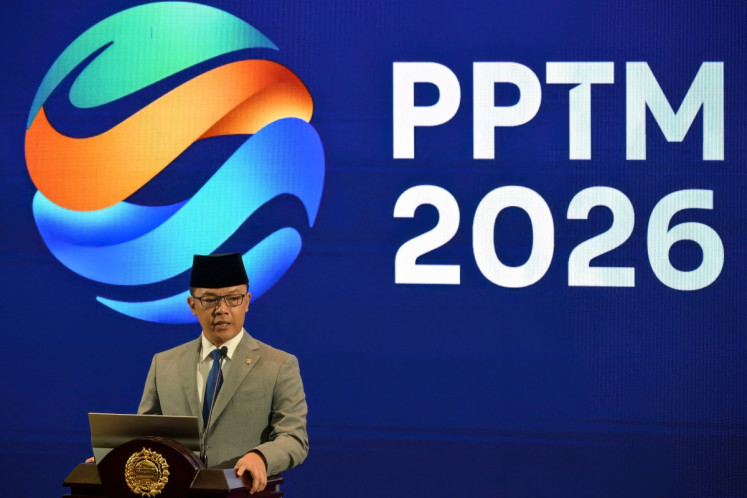Popular Reads
Top Results
Can't find what you're looking for?
View all search resultsPopular Reads
Top Results
Can't find what you're looking for?
View all search results‘Weak’ KPK set to lose war: ICW
Corruption watchdogs have warned the government that unless the Corruption Eradication Commission (KPK) is given enough resources to prosecute graft cases, the country risked losing its battle against corruption
Change text size
Gift Premium Articles
to Anyone
C
orruption watchdogs have warned the government that unless the Corruption Eradication Commission (KPK) is given enough resources to prosecute graft cases, the country risked losing its battle against corruption.
Emerson Yuntho of Indonesian Corruption Watch (ICW) felt the KPK was being “too careful” when dealing with corruption cases involving top officials from political parties, simply because it lacked sufficient human resources to build strong cases.
“Now, one investigator handles too many cases, so it’s quite understandable that the progress of the investigations is relatively slow,” Emerson told The Jakarta Post on Sunday.
He also said that problems also lie in the fact that most of its investigators came from the National Police and the Attorney General’s Office, thought of as some of the most corrupt institutions in the country.
“The commission has to run faster and they have to start recruiting independent investigators, not from the police or the prosecutors’ offices. There’s no legal barrier for the KPK to recruit independent investigators. The ball is now in the hands of the KPK and it’s up to them whether they take the option.”
The KPK has fully depended on the police and the AGO as members of its investigative and prosecution sections. Since its creation, the antigraft body has enjoyed massive levels of public support in its prosecution of corrupters.
The same outpouring of support has also been seen in its current spat with the House of Representatives’ Commission III overseeing legal and domestic affairs, which has blocked the former’s plan to build a new headquarters.
Critics, however, said that the KPK had recently squandered its limited resources to fight a public relations battle with politicians while only posting lackluster performance in prosecuting graft cases.
The KPK has long been seen as picking and choosing graft cases for investigation, an accusation which appeared to be confirmed with the sudden arrest of Buol Regent Amran Batalipu, who was alleged to have accepted a bribe to issue a permit for a plantation company owned by Democratic Party politician Sri Hartati Murdaya.
The KPK has also pursued investigations against a number of senior politicians within the Democratic Party, including its chairman Anas Urbaningrum, senior politician Andi Mallarangeng and lawmaker Angelina Sondakh.
The commission recently detained Miranda S. Goeltom, former senior deputy governor of Bank Indonesia, in a bribery case that led to her selection for the post.
The case has also seen 33 lawmakers from different political factions within the House sentenced to jail.
The former commissioner of Hong Kong’s Independent Commission Against Corruption (ICAC), Bertrand de Speville, said that there was a risk in the KPK being seen as selective in picking its targets for investigation.
He said that the public might consider the KPK to be politically-motivated when prosecuting corruption cases.
De Speville said that the KPK could comprehensively prosecute graft cases only if it had enough manpower.
“With more than 5 million civil servants, 500,000 police officers and more than 200 million citizens, it’s not enough to eradicate corruption in Indonesia with just 750 people working for the KPK,” he said late last week.
In order to make significant progress, the KPK needed to make adjustments, he said, including to investigate every corruption case reported by the public and to open representative offices in the country’s 33 provinces.
“The government must be ready to invest more in the fight against corruption. A decent budget allocation for an anticorruption body is 0.5 percent of a country’s overall budget,” de Speville said.
He also called on the Indonesian public to persevere in its fight against corruption as it would take a long time to succeed.
KPK deputy chairman Bambang Widjojanto said in addition to requiring more investigative staff and budget resources, the antigraft commission also needed to have its own training center. Bambang also said that it would take some time before the KPK could handle all the graft cases reported by the public.
“For the suggestion that we have to handle all cases reported by the public, we’ll consider that for our new anticorruption grand strategy. We are currently discussing it,” he said.










